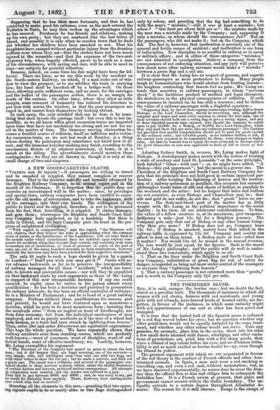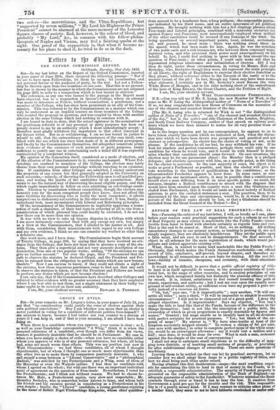THE FORBIDDEN BLUSH.
RED, it is said, enrages the bovine race ; but we doubt the fact, stated as a peculiar trait. The thousands of instances in which old women with red cloaks, farmers with red waistcoats, and young girls with red ribands; have braved herds of horned cattle, are for- gotten, in favour of the instances in which some unlucky Wight with red appurtenances of one sort or other has been gored and trampled. It is true that the baited bull of the Spanish arena is inflamed by a red flag waved before his eyes ; but we question whether any other gentleman would not be equally irritated by the same treat- ment, and whether any other colour would not serve. Take any grandee, for example, place him in the arena, shoot into his sides a few small darts adorned with fusees, whirligigs, and other varia- tions of pyrotechnic art, prick him with a fewgoads, then wave a riband of any colour before his eyes, and eieheafihuman irrita- bility is not as much excited as bovine would be—ay, even though the riband be yellow.
The greatest argument with which we are acquainted in favour of the red theory is the conduct of French officials and other Aus- trianized animals. In Spain, a man may wear a red smoking or travelling cap, and even a red sash, without molestation; but, as we have observed experimentally, no sooner does he cross the fron- tier than the official flies at him and obliges him to relinquish the forbidden hue. It is a French axiom at present, that gales and government cannot coexist within the Gallic boundary. The an- tipathy extends to a certain degree throughout Absolutist do- mains. The reason for it is still obscure. Rouge is the ensign of
two orders—the meretricious, and the Ultra-Republican ; but " supported by seven millions," " My Lord his Highness the Prince President" cannot be alarmed at the mere memory of the Leicester Square classes of society. Red, however, is the colour of blood, and probably " My Lord, &c., in common with his fellow-philan- thropists of Naples and Vienna, may feel a fainting-qualm at the sight. One proof of the supposition is, that when it became ne- cessary for his plans to shed it, he tried to do so in the dark.



























 Previous page
Previous page